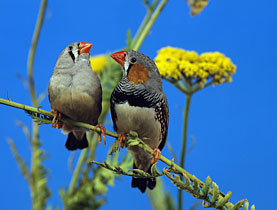Birds, like us, know the song before they sing

Zurich University neurologists have discovered that songbirds are constantly assessing the notes they sing, affording a glimpse into how birds hear themselves.
The findings, published on Thursday in the journal Nature, suggest that songbird brains can somehow anticipate the notes they should be singing before they are actually sung.
That has implications for how humans acquire language, says Richard Hahnloser, a professor of neuroinformatics and lead author of the study.
“We could make a reasonably good analogy with a toddler,” he told swissinfo.
“Our findings make it very plausible that young children know what they would like to hear or what they expect to hear. When they babble they are trying to match that expectation.”
In the animal world there are very few species that learn how to vocalise from one another. Other than humans, only whales, dolphins, bats and songbirds can do it.
While scientists have studied the way songbirds acquire their songs and why, this is the first time researchers have been able to see the process at the level of cells.
Birdbrains
Hahnloser, along with a graduate student, performed surgeries on older juvenile zebra finches to implant extremely fine electrodes into their brains.
After the birds recovered, the scientists finely tuned the electrodes to monitor electrical impulses fired by specific neurons as birds sang and listened to their songs. The results, gathered over three years, were surprising, he says.
The neurons that came into play when the finch listened to the song of another finch were different from the neurons that the bird used to listen to itself. Other cells fired before expected, suggesting the bird almost had some sort of neurological sheet music to reference.
More notably, when the scientists blended the bird’s song with different notes and patterns played back through loud speakers, the brain had specific cells firing to detect these minute differences.
“We found how they perceive themselves,” Hahnloser said. “They know what notes are supposed to come next. They notice the tiniest changes.”
Sexy songs
Male finches sing wildly complex songs that are perfected with help from older birds. Adult finches have songs that are highly organised and stereotyped whereas young birds more or less babble.
The older juveniles used in the study had developed songs but not yet mastered them, allowing scientists to study how the birds perceived their own imperfections, Hahnloser said.
This is critical in how males find mates, since females judge the quality of a male’s song.
Sarah Woolley, a professor of behavioural science at Columbia University in the United States, has studied the effects various songs can have on finches. She said if the male’s song isn’t “sexy” enough, the female would look elsewhere to mate.
“In the laboratory we can set it up so that [a poorly singing male] is her only option, in which case she’ll go for it,” she told National Public Radio following her own study last year.
“However, if she’s offered the opportunity to choose a male who sings a complex or what we call ‘sexy’ song, she will choose him.”
swissinfo, Tim Neville
Songbirds are widely used to study vocal learning because of the diversity of the songs they can produce.
Other scientists have discovered specific regions within bird brains that control the timing behind the songs. Cooling that particular area slows the song but not the notes.
The notes themselves appear to be produced by two independent sound generators that benefit from “superfast” muscles that can twitch more quickly than any other vertebrate muscle.
These muscles allow the birds to control sounds with “millisecond precision”, Utah University scientists recently found.

In compliance with the JTI standards
More: SWI swissinfo.ch certified by the Journalism Trust Initiative




You can find an overview of ongoing debates with our journalists here. Please join us!
If you want to start a conversation about a topic raised in this article or want to report factual errors, email us at english@swissinfo.ch.